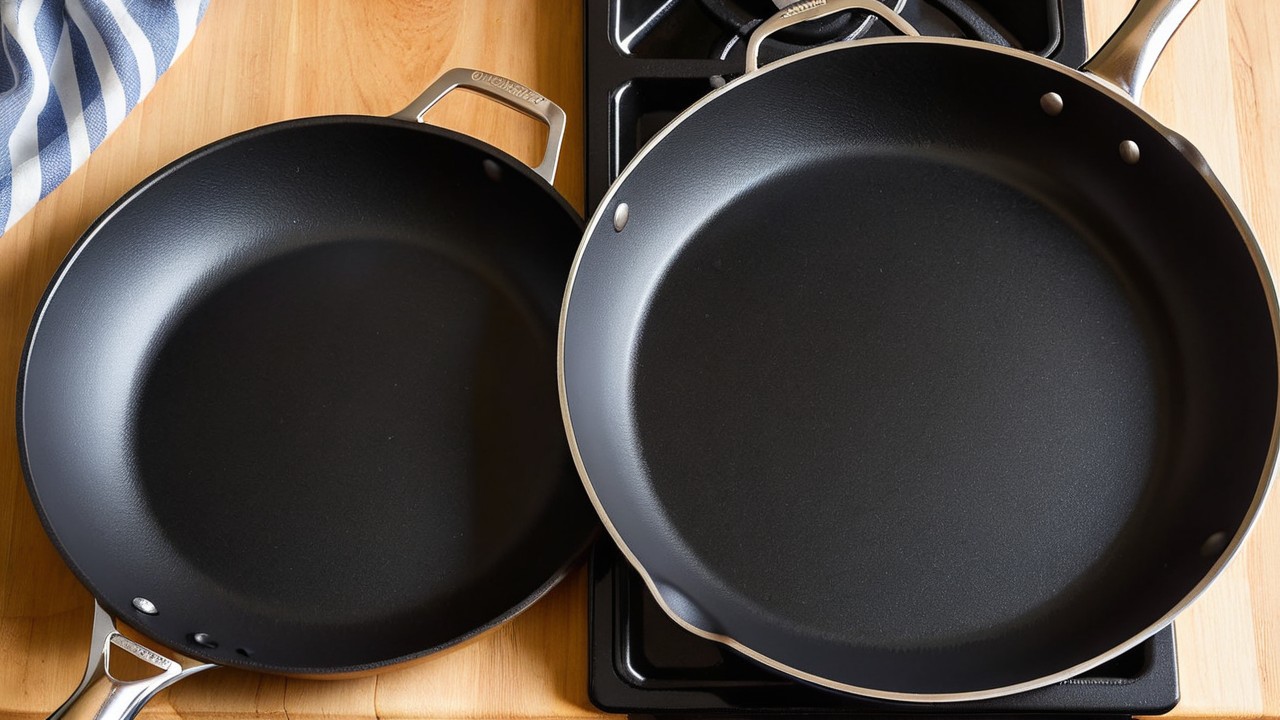Why you Should Not Use Metal Spoon On Non Stick Pan?

Are you tired of constantly replacing your non-stick pans? One of the reasons for their short lifespan could be the use of metal spoon on the non stick pan. Using metal spoons on non-stick pans can scratch and damage the delicate coating, reducing its effectiveness and lifespan. Not only that, but it can also release toxic chemicals into your food. In this article, we’ll cover why you should avoid using metal spoons on non-stick pans and provide alternative utensils that will keep your pans in top shape for years to come. So, if you want to extend the lifespan of your non-stick pans and ensure healthy cooking, keep reading to learn more about the dangers of using metal spoons on non-stick pans.
Why Metal Spoons Should Not be Used on Non-stick Pans??
While non-stick pans have many benefits, they require special care to maintain their non-stick properties. One of the main precautions to take is to avoid using metal utensils, specifically metal spoons, on a non-stick surface. Here are some reasons why:
Scratches the Non-stick Coating
Non-stick pans have a coating of polytetrafluoroethylene (PTFE), which is a synthetic polymer that creates a non-stick surface on the pan. This coating is delicate and can be easily scratched by metal utensils, such as metal spoons. When the coating is scratched, it creates small crevices on the surface of the pan, which can trap food and make it difficult to clean. The scratches can also reduce the effectiveness of the non-stick surface, causing food to stick to the pan and making it harder to cook.
Releases Toxic Chemicals
When the non-stick coating is scratched, it can release toxic chemicals into the food. One of the chemicals that can be released is perfluorooctanoic acid (PFOA), which has been linked to various health problems, including cancer, thyroid disease, and infertility. PFOA is also known to persist in the environment and can accumulate in the body over time. While many non-stick pans are now PFOA-free, the scratches can still release other harmful chemicals into the food. It is best to avoid scratching the non-stick coating to prevent the release of these chemicals.
Reduces Lifespan of the Pan
When the non-stick coating is damaged, the lifespan of the pan is reduced. The scratches can cause the coating to peel off over time, making it less effective and potentially unusable. Once the non-stick coating is damaged, it cannot be repaired, and the pan will need to be replaced. This can be costly and inconvenient, especially if the pan is relatively new.
To prevent these issues, it is best to avoid using metal spoons on non-stick pans. Instead, use utensils made of silicone, wood, or nylon. These materials are gentle on the non-stick coating and will not scratch or damage it. They are also non-reactive, which means they will not release harmful chemicals into the food. By using the proper utensils and taking care of the non-stick pan, it can last for years and continue to be a valuable kitchen tool.
So, that was the answer to your main query today. However, here I would recommend you to keep reading, as I am going to explain non stick pans and what are some alternatives you can use instead of using your metal spoon on non stick pan. Keep Reading Please!
2.What are Non-Stick Pans?
Non-stick pans are designed to prevent food from sticking to the surface, making cooking and cleaning much easier. The non-stick coating is made of a substance called polytetrafluoroethylene (PTFE), which is also known as Teflon. The coating is applied to the pan’s surface to create a non-stick layer that prevents food from sticking and allows for easy release of food.
Benefits of Non-Stick Pans
Non-stick pans offer many benefits, including:
Easy to Clean: The non-stick surface makes cleaning a breeze. Food does not stick to the surface, so cleaning only requires a quick wipe with a sponge or cloth.
Healthy Cooking: Non-stick pans require little to no oil or butter, making them a healthy cooking option. It also allows for cooking food with less fat, which is beneficial for health-conscious individuals.
Versatile: Non-stick pans can be used to cook a wide range of foods, from eggs to pancakes to stir-fry. It is a versatile kitchen tool that is perfect for any home cook.
Alternatives to Using Metal Spoons on Non-stick Pans
There are several alternative utensils that can be used on non-stick pans, including:
1. Silicone Spoons:
Silicone spoons are flexible and heat-resistant, making them perfect for use on non-stick pans. They are also non-reactive, so they won’t damage the non-stick coating.
2. Wooden Spoons:
Wooden spoons are another great option for non-stick pans. They are gentle on the surface and won’t scratch or damage the non-stick coating.
3. Nylon Spoons:
Nylon spoons are lightweight and heat-resistant, making them great for use on non-stick pans. They are also non-reactive, so they won’t damage the non-stick coating.
Proper Care for Non-stick Pans
To ensure the longevity of non-stick pans, it is important to take proper care of them. Here are some tips to keep in mind:
✔️Avoid High Heat: Non-stick pans should not be used over high heat as it can damage the non-stick coating.
✔️Hand Wash Only: Non-stick pans should be hand washed with a soft sponge or cloth. They should not be put in the dishwasher as the harsh detergents can damage the non-stick coating.
✔️Use the Proper Utensils: As we’ve discussed earlier, metal spoons should be avoided on non-stick pans. Instead, opt for silicone, wooden, or nylon utensils.
✔️Store Properly: Non-stick pans should be stored properly to prevent scratches or damage. They can be stacked with other non-stick pans or separated with soft padding.
Conclusion
In conclusion, non-stick pans are a great kitchen tool that makes cooking and cleaning easy. However, it is important to take special care while using them. One of the precautions to take is to avoid using metal spoons on the non-stick surface as it can damage the non-stick coating and release toxic chemicals into the food. Instead, opt for silicone, wooden, or nylon utensils. By taking proper care of non-stick pans, they can last for years and continue to be a valuable kitchen tool.

Written by Ikra
More From This Category

How to Care for Non-Stick Pans (Without Ruining Them in a Month!)
Alright, let’s talk about non-stick pans. You finally got one. Maybe it’s a budget-friendly pan. Maybe it’s a fancy, high-end set that made your wallet cry. Either way, you’re holding it like a newborn baby, wondering, how do I not mess this up? Because let’s be real,...
Using a Metal Spatula on a Stainless Steel Pan-What to Know?
Using a Metal Spatula on a Stainless Steel Pan-What to Know? Cooking is a popular pastime and a necessary life skill that requires the right tools to achieve the best results. One of the most important tools in any cook’s arsenal is the spatula. Spatulas come in...
Best Cookware and Bakeware Sets: Affordable Combo
Best Cookware and Bakeware Sets: Affordable Combo Looking to upgrade your kitchen game? Investing in a high-quality cookware and bakeware set is a great place to start. Not only can the right pots, pans, and baking dishes help you achieve better results in the...
5 Best Cookware Sets of 2023: Most Stylish
5 Best Cookware Sets of 2023: Most Stylish The kitchen is the heart of the home, and high-quality cookware is essential for any foodie or home chef who wants to elevate their cooking. We have scoured the top brands to find the premium cookware sets that will inspire...


